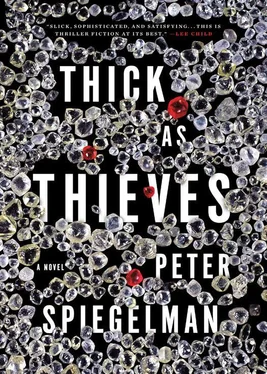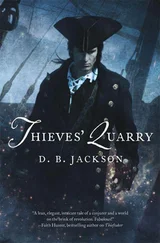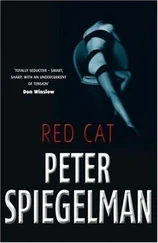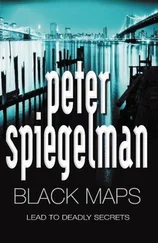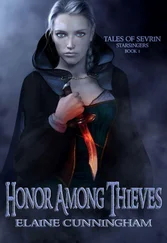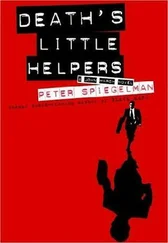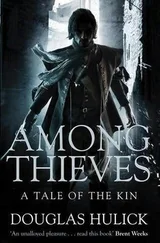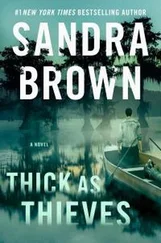Peter Spiegelman - Thick as Thieves
Здесь есть возможность читать онлайн «Peter Spiegelman - Thick as Thieves» весь текст электронной книги совершенно бесплатно (целиком полную версию без сокращений). В некоторых случаях можно слушать аудио, скачать через торрент в формате fb2 и присутствует краткое содержание. Жанр: Триллер, на английском языке. Описание произведения, (предисловие) а так же отзывы посетителей доступны на портале библиотеки ЛибКат.
- Название:Thick as Thieves
- Автор:
- Жанр:
- Год:неизвестен
- ISBN:нет данных
- Рейтинг книги:4 / 5. Голосов: 1
-
Избранное:Добавить в избранное
- Отзывы:
-
Ваша оценка:
- 80
- 1
- 2
- 3
- 4
- 5
Thick as Thieves: краткое содержание, описание и аннотация
Предлагаем к чтению аннотацию, описание, краткое содержание или предисловие (зависит от того, что написал сам автор книги «Thick as Thieves»). Если вы не нашли необходимую информацию о книге — напишите в комментариях, мы постараемся отыскать её.
Thick as Thieves — читать онлайн бесплатно полную книгу (весь текст) целиком
Ниже представлен текст книги, разбитый по страницам. Система сохранения места последней прочитанной страницы, позволяет с удобством читать онлайн бесплатно книгу «Thick as Thieves», без необходимости каждый раз заново искать на чём Вы остановились. Поставьте закладку, и сможете в любой момент перейти на страницу, на которой закончили чтение.
Интервал:
Закладка:
Here he is Gregory Frye, investor in distressed real estate, down from Boston for an indefinite stay. The doorman greets him by name and makes a joke about the Red Sox, and Carr smiles and nods and gets on the elevator.
He leaves the lights off in the apartment, pulls six beers from the refrigerator, and settles on the sofa, before the tall windows. He opens a bottle and drinks half in one pull, and he’s watching the distant lightning when his cell phone burrs. Eleanor Calvin’s number appears on the display, and he tosses the phone to the other end of the sofa, where it glows like a ghost light in a theater.
“Shit.” He sighs.
He’s been trying, since he left Stockbridge, to dredge up some warmth for Arthur Carr-to find a happy memory of his father or, barring that, any memory that isn’t tainted by anger, disapproval, or disappointment. Maybe he’s been looking for that for most of his life. The best he’s done lately is La Plata, southeast of Buenos Aires, out in the Rio de la Plata.
They were sailing then, just the two of them, in an eighteen-footer his father had rented for the day. The wind was from the east, the estuary was brown and choppy, and the sun was waning but still bright. Carr was twelve.
He remembers his father in a faded blue polo shirt, shorts, and bare feet, his arms ropy and brown, and his face shaded by a long-billed cap. They’d been running through man overboard drills for most of the afternoon, steering figure eights again and again to rescue an orange life vest that his father kept flinging over the side.
“There goes Oscar,” Arthur Carr would say, and toss the vest again.
His father did the spotting and fished out the vest when they came alongside; Carr was in the cockpit, one hand on the tiller, the other on the lines.
“Bring her around- quickly now-the man is drowning, after all. Now come to his windward side -his windward-that’s good. Now ease up on the sheets. Let them luff, for chrissakes-you don’t want to run by him!” Carr had gone through it too many times to count that afternoon.
For the last drill of the day, his father wanted Carr to do it all-spot, sail, and haul in the victim. “Pretend for a moment that you actually had a friend, and it was just the two of you out here. Now what would happen if your friend went in? What would you do-watch him drown? You can’t just sit there and watch.” And over the side the vest went once more.
“You’re on your own now,” Arthur Carr said.
Carr’s heart was pounding, but he kept his head on a swivel, kept his eyes on the bobbing patch of orange, and kept them off his father, who crouched in the companionway and stared at him like a baleful bird. He guided the boat away from the vest and, when he had enough room, tacked smartly. He panicked for an instant as the bow swept around and he lost the vest in the loping brown swells, but he found it again, and lined up on its windward side. He came in on a close reach, and let his sails luff. As the boat slowed, he scrambled under the boom. He kept low, gripped a stanchion with one hand, and ducked under the lifeline. He leaned out, but the vest was just beyond his straining fingers. Carr slid his hand up the stanchion to the lifeline and leaned out farther. And then a big swell hit.
There was a forward pitch, a sickening drop, scrabbling fingers, rushing, flooding cold, and a blow to the head that ran through Carr’s whole body. There was bubbling and roaring, and no time to call out, and no breath to call with. The shadow of the boat rose above him and began to fall again, and then Arthur Carr had a fist through the front of his life vest-was dragging him up through the brown water, up into the air, and dropping him on the cockpit bench.
Carr coughed and sputtered, and his father wrapped a blanket around him and studied his face. He peered into one eye and then the other, and put alcohol and a bandage over the gash on his cheek, where he’d slammed into the hull. Then he took the tiller, turned the boat back toward the marina, and shook his head in disgust.
“Now you’re both dead,” his father said flatly, “you and your nonexistent friend.”
That’s the best he can do: an afternoon more than two decades back when his father hadn’t actually flown into a rage, had instead been only casually cruel, but had cared enough to pluck him from the river. Though he wasn’t sure about the caring part-saving him might simply have been easier than explaining his absence to Carr’s mother.
Carr takes another pull on his beer and empties the bottle-his third somehow. Blue light is rippling through the sky, and a red light is blinking on his phone in the corner of his sofa. Mrs. Calvin has left another message. He opens a fourth beer, takes a long swallow, and hears his father’s voice again: You can’t just sit there and watch .
But watching is what he’s best at-what he’s always been best at, from when he was very small: the comings and goings of neighbors; the shopkeepers in their storefronts, sweeping, chatting with customers, hectoring clerks; the deliverymen; the embassy drivers; the maids and cooks and gardeners; and his parents most closely of all. His father didn’t like it-it made him edgy, he said-but his mother didn’t mind. In fact, she encouraged it, nurtured it, made a virtue of it, and a game.
He remembers sitting on her lap, in the tall windows of one of their houses, looking out on a tree-lined avenue. Was he even five years old? She would place a pale finger on the glass and point, and he would follow her gaze. Then she would put her hand over his eyes. ?Que ves, mijo? What do you see?
And he would tell her. A man with a dog. A lady in a hat. A blue truck. A green taxi. A grandpa at a cafe table. He remembers the softness of her palm across his brow, the smell of her hand-gardenias and tobacco. And what is the old man doing? Reading a newspaper. Smoking. Drinking from a cup. What kind of cup? What color hat? How large a dog? They would go on and on, in English, in Spanish, as afternoon went down to dusk. He would lean against her, sleepy, her voice warm and husky in his ear.?Que color es el coche, mijo? And how many men are in it?
When his father returned from work-always furrowed and simmering, his tie askew-the game would stop, and it was as if his mother had left the room. As if she’d left the house altogether. She took him from her lap, and her arms were stiff and cool. Her hazel eyes were narrow. She spoke quietly, and only in English, and she said very little. Mostly she listened to Arthur Carr’s litany of irritations and slights, nodding without ever conveying agreement.
Carr remembers his father’s voice-droning at first, and growing louder as the cocktails took hold. He remembers his father’s rumpled shirts, damp spots under the arms, and his father’s broad, sloppy gestures. He remembers his mother’s rigid shoulders, a vein thrumming in her neck, her stillness otherwise. He would try to catch her eye sometimes-offer up a grimace or a conspiratorial smirk-but it was as if he wasn’t there. Or she wasn’t. Other times, he would perch in the window and continue their game on his own, but inevitably his father grew irritated.
“It’s like living with a goddamn cat,” Arthur Carr would mutter, pulling him from the sill. “Nobody likes a cat.”
More lightning, another beer, and Carr thinks about his father’s anger and his mother’s distance, and he remembers the maps.
His mother was a great one for them. Maps and guidebooks and histories and almanacs-but especially maps. When word of a new posting would come, despite Arthur Carr’s grumblings-or perhaps because of them-she would smile, haul out the maps, and study them.
“Should we just stumble around like tourists?” she would say to Carr. “Get lost on our way to buy ice cream? No-we must know something about this place. We can’t have people think you are un hombre inculto. ”
Читать дальшеИнтервал:
Закладка:
Похожие книги на «Thick as Thieves»
Представляем Вашему вниманию похожие книги на «Thick as Thieves» списком для выбора. Мы отобрали схожую по названию и смыслу литературу в надежде предоставить читателям больше вариантов отыскать новые, интересные, ещё непрочитанные произведения.
Обсуждение, отзывы о книге «Thick as Thieves» и просто собственные мнения читателей. Оставьте ваши комментарии, напишите, что Вы думаете о произведении, его смысле или главных героях. Укажите что конкретно понравилось, а что нет, и почему Вы так считаете.
